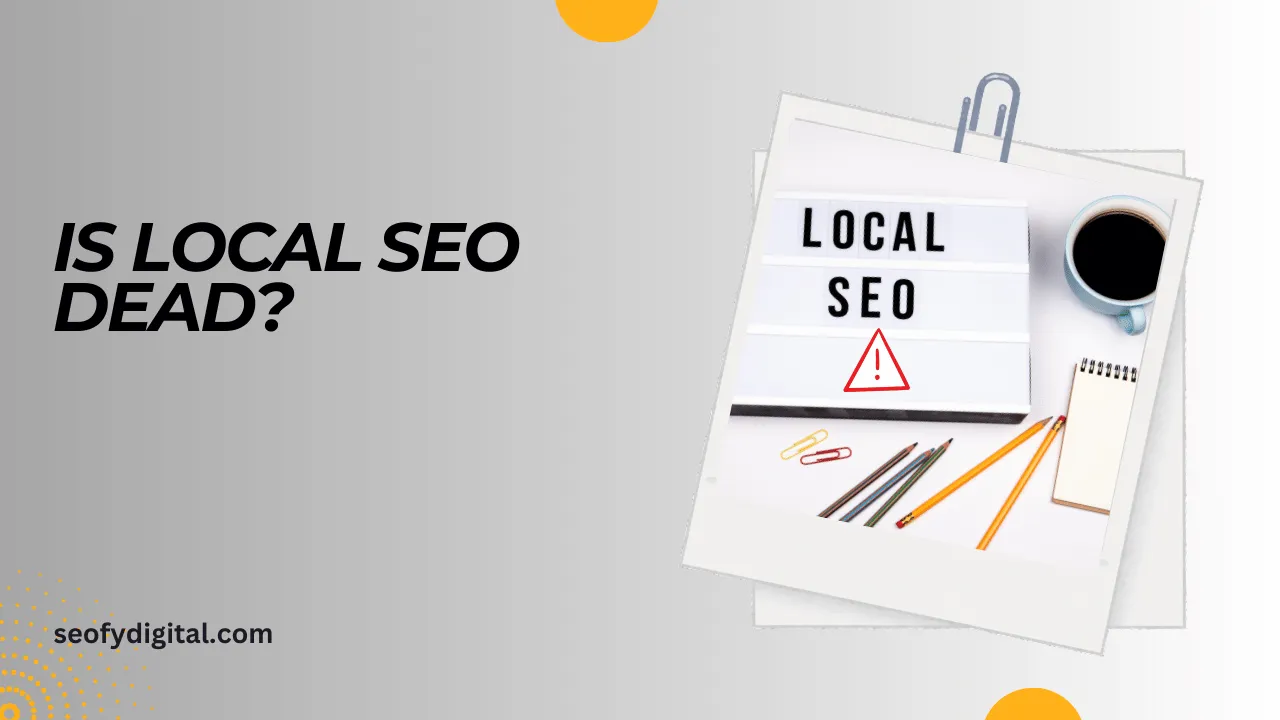Is Local SEO Dead? Why It’s Far From Obsolete
In a world where digital trends seem to evolve overnight, many business owners and marketers are left wondering, “Is local SEO dead?” With new algorithms, AI-driven search results, and an increased focus on social media marketing, some may feel that the power of local SEO has faded into the background.
But is that really the case? The reality is that local SEO is not only alive but also evolving, adapting to meet the needs of businesses and customers in ways we may not fully appreciate yet. For local businesses, mastering local SEO is often the difference between thriving and barely surviving in their local markets.
Local SEO remains a powerful tool for businesses aiming to reach customers in their own backyards. This marketing approach targets people searching for services “near me” and helps ensure they find businesses that match their needs.
The competitive edge provided by local SEO can be invaluable, especially in smaller communities where proximity and visibility matter more than ever. As Google continues to emphasize local results, businesses need to optimize their digital presence, or they risk falling behind in the crowded online marketplace.
In this article, we’ll explore why local SEO is still essential, covering recent trends, best practices, and the future of local SEO. From the rise of voice search to the impact of mobile-friendly websites, the landscape is continually changing—and local SEO strategies are evolving right along with it. Whether you’re a business owner, marketer, or curious reader, stay with us to uncover why local SEO is still as relevant as ever.

Contents
The Enduring Importance of Local SEO
Local SEO captures local intent, helping businesses meet the needs of customers in their immediate area. When someone searches for “restaurants near me” or “auto repair in [city],” Google’s algorithm highlights businesses that match those search terms in proximity and relevance. This local intent drives foot traffic, online inquiries, and calls, creating a seamless customer experience and establishing trust between businesses and potential customers.
Google’s commitment to prioritizing local search results reinforces the importance of local SEO. As part of its mission to deliver highly relevant results, Google has tailored its algorithm to favor businesses with strong local signals, like a well-optimized Google My Business (GMB) profile and positive customer reviews. These signals allow businesses to show up in Google’s Local Pack—the map-based list that appears at the top of local search results—enhancing visibility and credibility in the community.
Local reviews have a profound impact on both rankings and customer trust. Reviews influence whether a customer will visit or contact a business, with high ratings and positive feedback often leading to greater visibility in local search results. The power of customer feedback can’t be overstated, as it boosts credibility, builds trust, and encourages new customers to engage with local businesses confidently.
Recent Trends in Local SEO
Voice search is rapidly transforming the local SEO landscape. With the rise of voice-activated assistants like Siri, Alexa, and Google Assistant, people are searching in more conversational and specific ways. This shift means that businesses must tailor their content to capture natural language search queries, optimizing for questions like “Where can I find pizza near me?” instead of simple keywords like “pizza.”
The significance of mobile-first indexing cannot be overlooked. As Google continues to prioritize mobile-friendly websites, businesses must ensure their websites load quickly, have responsive design, and provide easy navigation. With a majority of local searches occurring on mobile devices, optimizing for mobile-first is no longer optional—it’s essential to a successful local SEO strategy.
Local SEO tools and platforms have emerged as invaluable resources for businesses. Platforms like Moz Local, BrightLocal, and SEMrush help businesses track rankings, manage local citations, and analyze competitors’ performance. These tools streamline the optimization process, allowing businesses to stay competitive in their local markets and improve their overall online visibility with targeted insights.

Best Practices for Local SEO
A well-optimized Google My Business (GMB) profile remains at the heart of successful local SEO. By keeping your GMB updated with accurate contact information, photos, and business hours, you increase your chances of appearing in relevant local searches. Responding to reviews and posting updates also helps engage customers and boost credibility in your local area.
Local citations play a significant role in improving local SEO. These mentions of your business’s name, address, and phone number (NAP) on local directories and review sites add legitimacy and trustworthiness in the eyes of search engines. Keeping your NAP consistent across all platforms builds a strong online presence, helping search engines better understand your business’s location and relevance.
On-page SEO for local searches focuses on using geo-specific keywords, such as city or neighborhood names, in titles, meta descriptions, and content. These keywords help align your website with local search intent, increasing the chances of ranking higher in search engine results pages (SERPs) when people search for local products or services.
Off-page SEO remains essential for strengthening your local SEO. Backlinks from reputable local sources, like community organizations or industry-specific websites, signal credibility to search engines. Additionally, social media marketing geared towards a local audience helps build relationships with potential customers and fosters community engagement.
The Future of Local SEO
Artificial intelligence and machine learning are increasingly influencing local SEO. AI-powered algorithms allow search engines to better understand user behavior, enabling more personalized search results based on location, preferences, and previous interactions. As AI advances, local SEO will continue to shift towards even more tailored experiences for users.
Emerging trends like local video SEO and augmented reality (AR) are expected to play significant roles in local SEO. Video content showcasing local businesses, products, or events can improve engagement and visibility in local searches.
AR offers innovative possibilities, such as allowing customers to visualize products in their spaces or explore local landmarks, further enhancing the customer experience and connection to local brands. For e-commerce businesses, local SEO provides a way to compete with larger retailers by establishing a regional presence.
By implementing local SEO strategies, online stores can capture location-based searches, helping them reach customers who value proximity and support for local businesses. This edge is particularly valuable in today’s e-commerce landscape, where personalized and regional targeting can lead to significant sales growth.
Conclusion
In a constantly evolving digital world, local SEO remains indispensable for businesses seeking to connect with local customers. The importance of understanding and capturing local intent, staying mobile-friendly, and using tools to optimize local SEO efforts cannot be overstated. As recent trends indicate, local SEO is not only alive but is also adapting to new technologies like voice search, AI, and even AR.
The future of local SEO holds exciting possibilities, with emerging trends like video SEO and AI-enhanced personalization poised to create deeper connections between businesses and their communities. For both physical and e-commerce businesses, local SEO will continue to offer tangible benefits, helping brands to attract and retain loyal customers.
Whether you’re a business owner or marketer, embracing local SEO as a core component of your strategy is a forward-thinking choice. Local SEO is far from dead; in fact, it’s only getting stronger as digital advancements provide new ways to engage local customers. So, dive in, adapt, and let local SEO drive your business to new heights in your community.
FAQs
1. Is local SEO still relevant in 2024?
Yes, local SEO is crucial for helping businesses connect with customers who prefer to support local brands.
2. How does local SEO work?
Local SEO works by optimizing a business’s online presence to appear in local search results, often based on location-specific keywords.
3. What is the importance of Google My Business for local SEO?
Google My Business is vital for local SEO, as it helps businesses appear in local search and map results, increasing visibility.
4. Does local SEO require regular updates?
Yes, local SEO needs consistent updates to maintain accuracy in listings, keywords, and overall online presence.
5. How does mobile-first indexing impact local SEO?
Mobile-first indexing prioritizes mobile-friendly sites, which is essential for local searches as most occur on mobile devices.
6. Are reviews important for local SEO?
Absolutely! Reviews boost credibility and improve rankings, encouraging customers to choose a business based on positive feedback.








